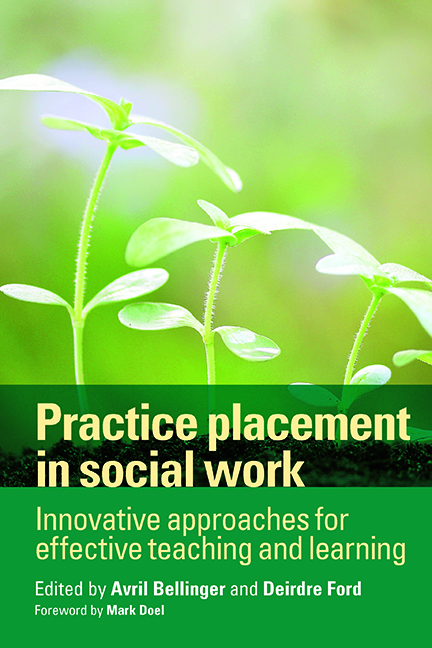Book contents
- Frontmatter
- Dedication
- Contents
- Foreword
- Notes on contributors
- Introduction
- One Student-led services
- Two International placements: learning from a distance
- Three The outside looking in – an independent social worker’s experience of practice educator work
- Four ‘Do you have to be white to pass this course?’ Developing support for black and minority ethnic students in a predominantly white area
- Five Men in social work education: building a gendered alliance
- Six Hidden in plain sight: use of an arts-based method for critical reflection
- Seven Getting our hands dirty: reconnecting social work education as if the earth matters
- Eight Social media for students in practice
- Nine Developing placement capacity in the third sector
- Ten Observations of student practice: what difference does observer qualification make?
- Eleven Filling the gap: constructive responses to the erosion of training standards for practice educators
- Twelve The concept of integrity in relation to failing and marginal students
- Thirteen Cultivating discretion: social work education in practice and the academy
- Index
Nine - Developing placement capacity in the third sector
Published online by Cambridge University Press: 01 September 2022
- Frontmatter
- Dedication
- Contents
- Foreword
- Notes on contributors
- Introduction
- One Student-led services
- Two International placements: learning from a distance
- Three The outside looking in – an independent social worker’s experience of practice educator work
- Four ‘Do you have to be white to pass this course?’ Developing support for black and minority ethnic students in a predominantly white area
- Five Men in social work education: building a gendered alliance
- Six Hidden in plain sight: use of an arts-based method for critical reflection
- Seven Getting our hands dirty: reconnecting social work education as if the earth matters
- Eight Social media for students in practice
- Nine Developing placement capacity in the third sector
- Ten Observations of student practice: what difference does observer qualification make?
- Eleven Filling the gap: constructive responses to the erosion of training standards for practice educators
- Twelve The concept of integrity in relation to failing and marginal students
- Thirteen Cultivating discretion: social work education in practice and the academy
- Index
Summary
Introduction
This chapter explores the principles that underpin the development of agency capacity to provide high-quality practice learning in third-sector agencies even when there is no qualified social worker on site. It is a reasonable expectation that students of any profession will learn to practise alongside an experienced and skilled practitioner. Indeed, the most recent Practice Educator Professional Standards (PEPS) issued by the UK College of Social Work emphasise the importance of practice educators being qualified and registered social workers. Furthermore, while there is some flexibility for students in their first placements, these standards state that for final placements with an off-site practice educator, ‘the student will work alongside a social worker who must be in a post requiring registration’ (TCSW, 2013: 16). However, in an environment of austerity, the reduction of state functions and the commissioning of statutory services from private and voluntary agencies, this standard may prove aspirational. There is evidence of regional diversity in placement provision (GSCC, 2012), revealing that some programmes are unable to obtain sufficient statutory placements for their students. Increasingly, the mixed economy of care means that many social workers are in posts that do not require registration, even within the state sector. Despite these seismic changes, the illusion persists that statutory placements are the gold standard and always fully available. In contrast, this chapter offers an alternative perspective through the voices of students, supervisors and practice educators to illustrate the quality of third-sector placements.
Partnership working is a key concept in this area of work and can have significant benefits for service users, the course, the students’ developing professional practice and for agencies themselves. We will share our experiences of working with students who have become ambassadors for the programme and, indeed, co-constructors of social work within voluntary, independent and private agencies, which, together, comprise the third sector. We will explore the benefits of taking students for all placement providers, both in the third sector and local authorities, that offer placements and post-qualifying employment (McGregor, 2013). Agency and student perspectives are central to the narrative, providing examples of best practice. Before exploring the underlying principles and our own learning, we set the local context within the current provision of social work placements in the UK.
Information
- Type
- Chapter
- Information
- Practice Placement in Social WorkInnovative Approaches for Effective Teaching and Learning, pp. 133 - 148Publisher: Bristol University PressPrint publication year: 2016
